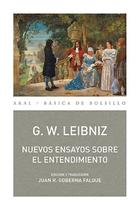
When we are born, is our soul completely empty or does it already contain the principles of divine law? Does our knowledge come from experience? This is the starting point of the New Essays on the Understanding, written by G. W. Leibniz between 1703 and 1704 with the purpose of refuting the ideas of John Locke expounded, a few years earlier, in his famous Essays on human understanding. The work takes the form of a dialogue between two characters: Filaletes, defender of Locke's empiricist postulates, and Teófilo, follower of the rationalist current and Leibniz's alter ego. With a new translation, profusely revised and annotated, the editor of these New Essays reveals the enormous intellectual wealth of Leibniz, one of the most relevant thinkers in the intellectual history of the modern world, and more especially if one takes into account his very remarkable contributions to fields of k...read more







